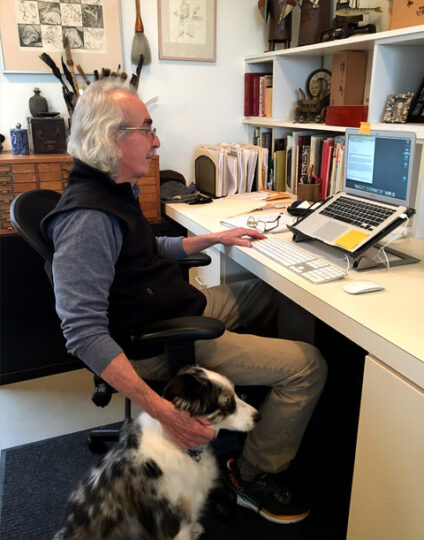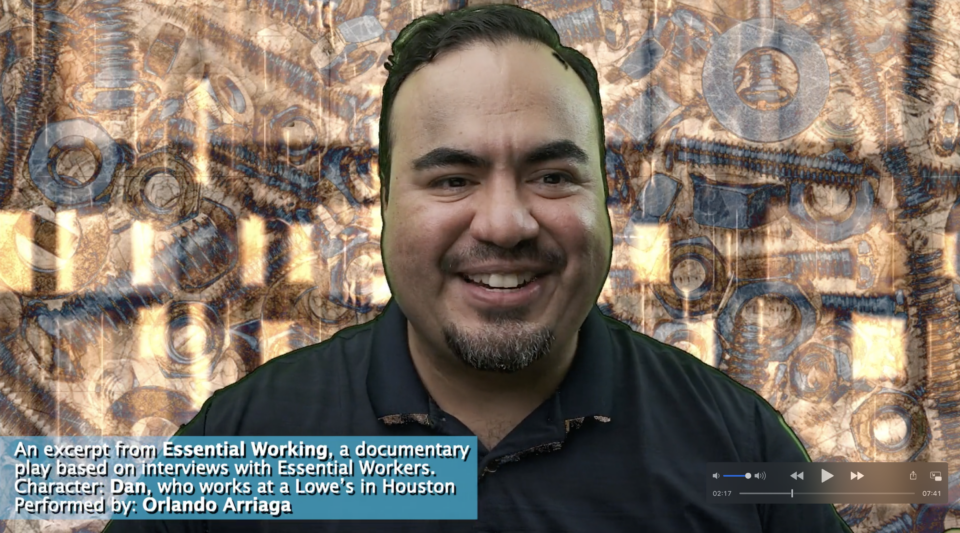It doesn’t take more than the click of a remote or a swipe on Facebook to see statistics and news segments detailing the ramifications of a global pandemic. In a moment so fraught with personal, physical and financial turmoil, the struggle to come to terms with recent events is an exhausting, daunting task. For KJ Sanchez, head of the playwriting/directing area, theatre is serving as a tool to analyze and come to a deeper understanding of these events. Sanchez is leading a group of collaborators as they unearth the names and faces buried deep within the headlines in a piece of documentary theatre that digs into the complex lives of those we call essential workers.
Months ago, as word of a pandemic started bubbling to the surface, Sanchez was approached by then President of The University of Texas at Austin Greg Fenves, who offered her a $50,000 grant to create a piece of documentary theatre addressing COVID-19. With this generous support from the President’s office and a strong background in documentary theatre, Sanchez began recruiting artists from across the nation to help field interviews and condense them into pages for a script. Among her collaborators are UT Theatre and Dance alumni Dan Caffrey, I.B. Hopkins, Paul Kruse, Cecelia Raker, Mason Rosenthal, Lane Michael Stanley and Jess Shoemaker, along with current student Oscar Salinas and recent Michener Center graduates Rachel Heng and Kim Tran. The team got right to work, unpacking real, personal experiences and repackaging them into performance pieces.

In creating a piece that directly addresses the realities of their current situation, Sanchez and her team are joining the throngs of theatre artists throughout history who have utilized their craft to present retellings of truthful events. Since its inception as an art form, documentary theatre has helped artists and audience members analyze their difficult realities, creating compelling performances that don’t shy away from what is taking place beyond the walls of the theatre. Rooted in initiatives like the Federal Theatre Project’s “living newspapers” during the Great Depression, documentary theatre seeks to present narratives pulled from direct sources such as newspapers, written letters or, in this case, hours of virtual interviews with essential workers. These recounted stories are then molded into scripts, using the original language to create performances that form a network of real-life experiences.
As the team of writers started interviewing candidates for what they were calling “Project 19,” the term “essential workers” encompassed professionals from epidemiologists to social workers to funeral home directors and hardware store clerks. This definition expanded, however, following the death of George Floyd, an atrocity that marked another momentous struggle in our current moment: that against systemic racism. In response, the project evolved further to include social activists, legal professionals and members of the police force as interview subjects.
Thus far, the team has conducted over fifty interviews, gaining perspective on these individuals’ lives, whose daily risks and struggles often fade into the background of the news cycle. “It is our goal to chronicle the complexities of the moment,” shared Sanchez, “to represent the underrepresented and by doing so, say to them: ‘We see you, we hear you, you matter.’” In centering these voices, Project 19, since renamed “Essential Working,” has positioned itself as a totally unique retelling of this year, focusing on the stories left untold.

Since beginning the process, “Essential Working” has moved beyond a simple retelling of events and developed into a study in coping, humanity and perseverance that truly encapsulates the complex reality of these times. In his interviews with an old friend and social worker, Caffrey shared that “the most compelling parts of our dialogue had very little to do with vaccines, lockdowns or other medical topics you could get just from reading the news.” These stories paint an intricate picture, delving into the challenges and exhaustion of working in customer service over the past few months while also sharing restorative moments of communities coming together to support one another.
Sanchez and her team have built a foundation for a piece of documentary theatre that commemorates the realities of working through a global pandemic; one that will no doubt leave a lasting impression on theatre goers for years to come. Previously, excerpts of “Essential Working” were presented at the UT COVID-19 Conference in November, featuring media designed by Jon Haas (M.F.A. 2018), and other theatre companies have already voiced interest in presenting the project for their audiences. Sanchez’s hope is to share the completed script as a staged reading at UT this spring. Until then, the team continues to listen and write, sculpting the stories that will define a distinct era in our history.

